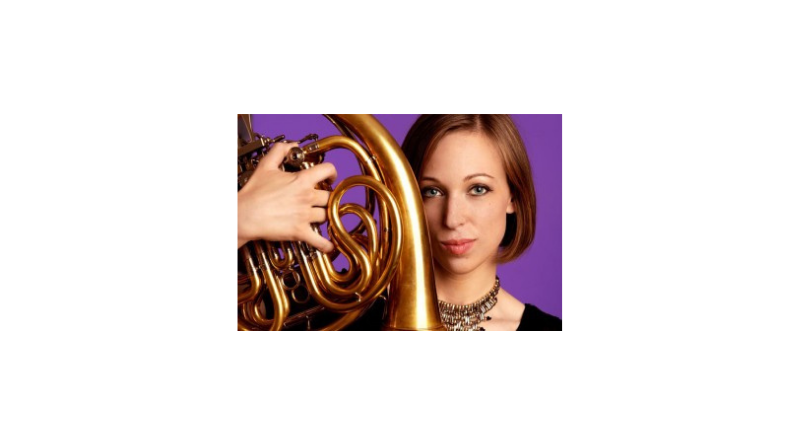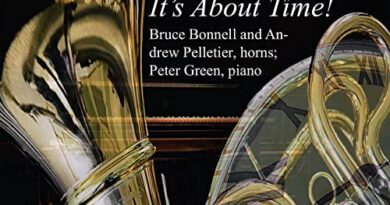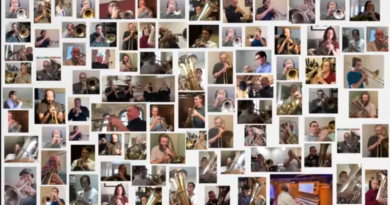My Practice Sessions: Leelanee Sterrett
Leelanee Sterrett is the Acting Associate Principal Horn of the New York Philharmonic.
What time do you begin your first practice session?
On days when I have a 10 am rehearsal, I begin my routine at 8:30 or 9:00 am. On other days, I am more flexible but like to have my routine started before noon.
What is your daily warm-up routine?
It changes from day to day, but I always start with some free buzzing and mouthpiece buzzing. From there, I build a routine based on what I need for the day, drawing exercises from probably about 12-15 different sources I have internalized as well as those I have created myself. My main guideline is that my routine must touch upon three primary pillars of technique/fundamentals:
1. Using all sides of the horn in all ranges (I play a triple horn, so for me, that means F/B-flat/F alto);
2. Working through the complete harmonic overtone series across the range of the horn (again using all sides of the horn); and
3. Building exercises based on scale and arpeggio patterns of all different types. I consider these the building blocks to horn technique. And on top of these fundamental guidelines, I layer more specific techniques like articulation/multiple tonguing, dynamic variation, slur practice, stopped horn, etc. So, my daily routine is free-form when it comes to specific exercises but grounded by the three principles above.
How long has this warm-up been a part of your practice sessions?
Approximately 9 years. But I would say I really only codified my three primary principles within the last 3 years.
How long is your warm-up routine?
Flexible, from 25-60 min depending on how much time I have.
What part of your warm-up do you look forward to the most?
I tend to enjoy harmonic slur exercises the most. That, and whatever point in the warm-up at which I feel ready to play and could turn to an etude or solo and feel comfortable!
What different elements have you changed (or removed) from your warm-up routine over the recent years?
I’ve become more flexible and trusting that my warm-up, even if it’s compressed time-wise, will prepare me to do what I need to do in my daily playing. I used to find it very difficult to play and practice in the morning (which is difficult as my job requires morning rehearsals and even the occasional 11 am concert!). But in the last few years, it has started to matter less the time of day when I play and I don’t worry at all anymore about early morning playing. I attribute this largely to my warm-up routine becoming more intuitive and flexible. I think of my warm-up as a tool kit which has everything I need to diagnose and fix my playing from day to day.
What time of day do you generally practice?
I prefer the afternoon and evening.
How many practice sessions do you typically have a day?
2-3
Do you have a strict time limit to each practice session?
No
After your last practice session of the day, do you do anything the night before to prepare for the next day’s sessions?
If my lips are feeling very swollen, I use topical arnica gel before bed. I may also take ibuprofen when I first wake up if I feel very puffy.
Do you have any non-music related routines such as meditation or exercise to help prepare you for your daily warm-up?
I wish I did! I am always intending to make time for breathing exercises but rarely am successful. I am an off-and-on runner, and I found having good cardio fitness makes me feel the most comfortable when playing.
What apps or products do you use to aid in your practice sessions?
Tunable and Tonal Energy Tuner apps on iPad/iPhone. I use the drone, tuner, metronome, and record/playback features on these apps.
How does your partner’s and/or family’s schedule fit into your practice sessions?
My husband works from home, so on the days that we are both at home, I have to work my practice sessions around his conference calls.
When you are on tour or traveling, how are you able to adapt your practicing to fit in with the given circumstances?
Yes. It takes more discipline because there is inevitable fatigue that goes along with traveling and a change in routine, especially when dealing with time zone changes. It’s so important just to force myself to get a warm-up in. When not traveling for work but on more like a vacation or family visit when I nonetheless need to practice, there is an element of guilt that comes with needing to prioritize practicing. I always remind myself that keeping a baseline of even just 45 min to an hour of playing per day is infinitely better to nothing. Basically, while traveling, my goal is just the maintenance of my chops.
If you fail to not get in a solid warm-up, do you do anything different for the rest of your practice sessions?
If I can’t get a solid warm-up, I remind myself of all the days that I *did* do a solid warm-up. Without my warm-up, I may feel that there are some gaps in my range or flexibility, and perhaps I feel less optimized for playing, but my fundamental ability to perform is more tied to long-term consistency and habits. I find it best to keep my eye on the big picture!
Is there anything else you would like to add that would be beneficial to other musicians?
Practicing is a life-long process! One of the things I love about being a musician is that no matter your level of accomplishment, there is always room to grow and learn and improve. I think I’ll be discovering things about myself and making changes to my practice routine for as long as I am a horn player. That’s an exciting thought to me and helps me to approach my practice with an open mind.



